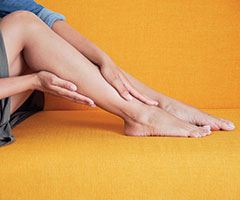Restless Leg Syndrome
Lee Health: Compassionate Care and Understanding for Restless Leg Syndrome
Our vascular and vein specialists understand the discomfort that restless leg syndrome can cause you or your loved ones. Our team is here to help you understand and treat your restless leg syndrome to help you improve your quality of life.
What is restless leg syndrome?
Restless leg syndrome, also called Willis-Ekbom disease, is a disorder that causes individuals an uncontrollable urge to move their legs while in a resting position for an extended period of time. This commonly occurs at night as they are trying to fall asleep. The urge to move can be described as the feeling of a tugging, aching, burning or itching sensation.
Common symptoms of restless leg syndrome include:
- Sensations that occur after periods of not moving
- Urge to move affected areas
- Temporary relief after movement
- Worsening of symptoms at night
These sensations often can be felt in the calf, but some patients experience the feelings across their entire leg. The sensations are temporarily relieved when the patient moves, stretches or massages the affected areas, but these are often not a permanent solution.
-
LPG Vascular Surgery - Cape Coral Hospital
-
LPG General & Vascular Surgery - Coconut Point
-
LPG General Surgery - Gulf Coast Medical Center
-
LPG General Surgery - Cape Coral Hospital
-
LPG Vascular Surgery – Creekside
Restless Leg Syndrome Causes
While there are various causes for RLS, in some cases it may be a genetic syndrome. In addition to the genetic source, RLS can also be associated with several other medical problems. Below are several factors that can increase the chances of experiencing RSL.
- Iron deficiency
- Nerve damage
- Kidney disorders
- Medications
- Pregnancy
- Heredity
- Diabetes
- Depression
Restless Leg Syndrome Treatment Options
Treatment options for RSL vary from based on the severity of symptoms and underlying medical conditions. Our experts find the best treatment option for each individual patient based on their specific medical history.
- Implementing healthy sleep habits
- Medication
- Exercise
- Dietary changes (healthy eating, cutting out caffeine and alcohol)
- Use of a heating pad or cold compress














